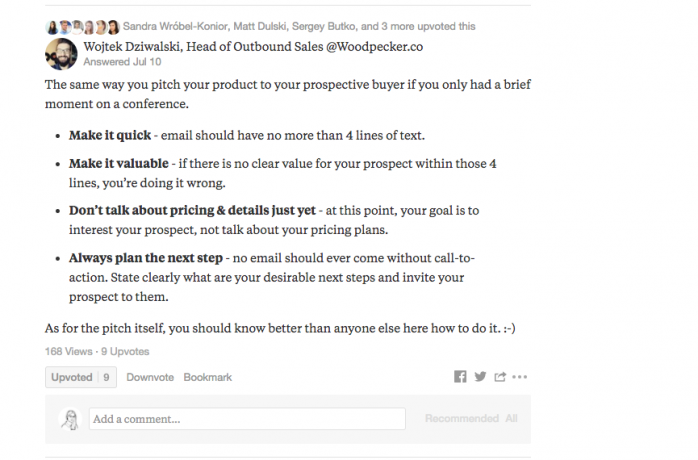Before you venture into prospecting, you should have an ideal customer profile in place. However, what if you have an ICP worked out and you’re stuck because you don’t know where to search for prospects?
Today, I’ll show you that the online places you enjoy being at can lend itself perfectly to building a quality contact list. And that’s based on Wojtek’s, Head of Outbound Sales, experience.
Wojtek decided to use a platform he already loved and understood to find contacts to invite to the webinar he was the host of. The webinar was about outbound sales tactics, a topic he’s knowledgeable about.
And what’s a better platform to look for people interested to learn new things than Quora?
What is Quora?
Quora is a question-and-answer platform. People come to the site to either ask or find an answer to the specific question they have. The pool of questions ranges from everyday matters to business-related dilemmas.
The Quora community provides answers to those questions. The most useful answer is placed as the first one. It is displayed at the top, right under the question itself. The users can upvote the answer they like the most and/or leave a comment.
Quora is gaining popularity these days. People use it as a regular social networking site or as a part of their inbound marketing strategy. It attracts a lot of famous writers, businessmen, and politicians. All users have two things in common. They want to find solutions to the problems they face, as well as share their knowledge and experience with the rest.
Why would you use Quora?
The platforms that aggregate companies, such as Capterra or G2Crowd, divide businesses by their type. If you’re looking only for SaaS companies, they are the way to go. However, you might not want that. You may want to target companies that face a clearly defined problem regardless of the type of their business.
Quora does that. The users join a topic or follow a question because they are genuinely interested in gaining knowledge and/or use their expertise to provide solutions.
What’s more, you don’t have to strain your brain trying to come up with a common denominator for all the contacts you’re reaching out to. Your job is done for you and that means that personalizing your emails will be much easier.
How to use Quora for targeting
Due to the complex structure of the site, there are many ways in which you can use Quora for prospecting. It all depends on what you look for.
Be an active member
Bear in mind that targeting on Quora won’t work unless you are an active member of the community. If you don’t set up an account, spend some time on the platform, and fully grasp its dynamics, the community will sense that you’re not genuine.
Wojtek has met with great results with targeting on Quora because he was an engaged user. He had his profile info filled in, he read and responded to many questions before he targeted the users.
Define an objective
Have a clear goal in mind. Without it your efforts may be futile. Wojtek wanted to make a webinar about outbound sales tactics. He wanted to find contacts who would be interested in attending the webinar. The prospective contacts would be eager to learn more about the topic. This was his objective.
Choose a tactic
Wojtek’s plan was to scrap Quora in search of the potential webinar attendees. That’s why he hoped to obtain contact info of the people active in the questions related to lead generation.
Even so, it doesn’t mean that he sent emails to every contact who expressed some sort of activity there. Quite the opposite, he came up with a tactic.
Because of the way Quora is built, not only can you see who wrote the answer, but also who follows the question and who upvoted a particular answer.

You may see who upvoted the topic if you click on the number of the upvotes.
Wojtek could send a webinar invitation to people who wrote the answers. They were keen on the topic. Yet, they understood the topic to such a degree that allowed them to answer the question. They may not have been interested in deepening their knowledge any further.
Secondly, he might have invited people who follow the whole topic, not the single question. However, he would meet with two options. Either they felt competent enough to answer questions from that topic or they were reading the answers in those questions. To put it simply, too many variables there.
Lastly, he might have invited the upvoters, which is the Quora users who found the answer helpful enough to press the upvote. And that’s exactly what he did. Those people were looking to deepen their knowledge. They were the perfect target for a webinar. Since his plan was to make a webinar for people who express a need to learn more about outbound sales.
Determine which tactic will work for you. Whether you want to contact:
- influencers – the people who actively answer questions
- knowledge-seekers – the people who upvote the answers
… and then proceed to gather their contact info.
What kind of contact info can you find on Quora?
You can discover a lot of important tidbits of information about your target group on Quora. From their areas of interest to their full names and social media handles.
Full name and company name
People don’t use aliases on Quora. They sign their profiles with their first and last names. A significant part of the community uses the site to network with other business professionals, so they put info about their company in their profile description. Quora encourages people to do that. In the “Credentials & Highlights” section, you can type in your company name and your position at the company.
Social Media profiles
Moreover, people link to their other social media profiles on Quora. This is useful if you look for somebody’s LinkedIn, Facebook, or Twitter. Those links are hidden under three dots right here:
How to gather info about your target group from Quora?
You can do that manually. Create an Excel file and columns where you list people’s first name, last name, company name etc. and then, use one of the tools that finds a business email of those people.
There are many useful tools for that. FindThatLead, Hunter to name a few. Cathy made a list a while back with 25 Tools & Services for Outbound Prospect List Building >>.
Wojtek saved himself an effort of manually typing everyone’s names by using a tool called ProspectHive. You should give it a try. It automatically downloads all the upvoters’ first and last names and puts it in the easily accessible file. Remember to plan out the snippets to personalize your message.
What’s the key takeaway?
The most important thing to remember is that you don’t need to look far to build a quality contact list. Sometimes, all you need to do is to inspect the platforms you enjoy using and think about how you can use them for reaching out to companies.
Platforms aggregating companies or professional social networking sites are great places to start, but you can be creative and think of other places, including Quora, to find your target groups.
If you’re a first-time cold emailer, a prospecting process might seem daunting. That’s why starting from the place you know how to navigate in can be a great idea. It will be way easier for you to come up with a good email copy, not least it lends you credibility in the eyes of the fellow users.
See also: 15 Places, Other Than LinkedIn, Where You Can Find Prospects >>.
The second part of the blog post is here: How We Asked Quora People to Attend Our Webinar: Vol. 2>>
READ ALSO

Can You Still Create a Predictable Sales Process? The Evolution of Predictable Revenue
I had an immense pleasure to talk with Collin Stewart, a Co-Founder and Co-CEO of Predictable Revenue, who hosts their podcast, interviewing B2B sales leaders on the biggest opportunities and challenges in the industry.

How to Generate More Leads After a Webinar?
I'm sure you can agree that webinars are time-consuming and stressful. Not only do you have to carefully plan the whole thing out, but you also need to oversee a lot of things, such as recording & sound quality, take care of the Internet connection, plus you need to make sure there's enough space for everyone to attend the webinar.

How to Send A Networking Follow-up Email? 2 Simple Approaches
A lot has been said about the importance of face-to-face communication when trying to connect with business partners or potential customers. That's why we attend various conferences, meet-ups, and networking events. It's all in the name of forging strong relationships that will push our businesses forward. Networking works perfectly for that, I must admit.

